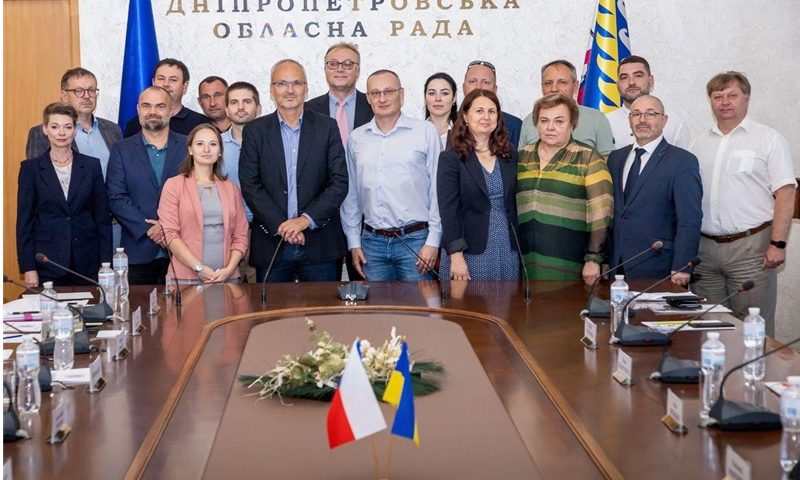Doing business

On 16 September 2024, at the Dnipropetrovsk Regional Council was held a meeting between advisor to the chairman of Dnipropetrovsk Regional Council Yevhen Marchenko, deputy director of Dnipropetrovsk Investment Agency Alim Molodan, , and the heads of 5 municipal enterprises of Dnipropetrovsk region, namely, ME “Aulskyi vodovid”, ME “Zhovtovodsky Vodokanal”, ME “Solonyansky Housing and Communal Services”, ME “Synelnykivskyi vodokanal”, ME “Verkhnedneprovsky Production Department of Water Supply and Sewerage” met with the delegation of the Czech Republic. At the meeting, the Czech Republic was represented by Mr. Ladislav Horak, the first secretary of the Embassy of the Czech Republic in Ukraine, Roksolana Drindak, territorial expert of the Eastern Europe, Western Balkans and Central Asia Department of the Ministry of Industry and Trade of the Czech Republic, Oksana Antonenko, head of the Ukrainian representative office of Czech Republic government trade support agency CzechTrade Ukraine, and representatives of 7 Czech companies operating in the water sector:
As a result of the full-scale military invasion of russia, more than 800 kilometres of water supply and 244 kilometres of sewerage networks have been destroyed in Ukraine, and about 70 pumping stations and 23 wastewater treatment plants have been destroyed or damaged. In addition, 70% of the population is under constant threat of being left without water as a result of missile attacks, and the risk of environmental disaster is increasing because of the destruction of water disposal and wastewater treatment systems.
Czech companies presented their areas of expertise and specialisation, including water treatment technologies, innovative approaches to wastewater treatment and reuse, and diagnostic capabilities for wastewater and water supply systems. Several companies already have experience working with Ukrainian companies and communities, including supplying mobile filtration stations in Dnipropetrovsk region, which suffered from the criminal actions of russian aggressors.
In turn, the heads of the water utilities briefed Czech companies on existing projects to improve and restore the operations of water utilities in the context of the war. The main challenges faced by the region’s utilities are disruptions in the logistics of reagent supply, rising electricity and lubricants costs, and deteriorating water quality in the rivers where water is taken. The water utilities were built in the 50s and 60s, so they have worn-out networks and energy-intensive equipment.
The water and wastewater sector now needs the support of Czech partners, as the process of rebuilding the destroyed infrastructure will be complex, requiring time for design, search for new approaches and sources of funding. Modernisation of equipment on water pipelines will improve the quality of service provision, ensure uninterrupted and trouble-free operation of pumping stations, and reduce their operating costs. The implementation of rehabilitation projects will improve the quality of water supply and treatment services, ensure prompt response and elimination of emergencies at water supply and sewage networks and treatment facilities.
Czech companies are interested in a long-term presence in the region and are looking for opportunities to establish cooperation with the region’s utilities. The Czech Republic is trying to respond quickly to the immediate needs of Ukrainian enterprises that arise during the war. Therefore, Ukraine programme was established with funding of €20 million per year. These funds can be used to implement small investment projects, including in Dnipropetrovsk region. The Czech side is also attracting the attention of large foreign donors to finance projects in Dnipropetrovsk region.
Dnipropetrovsk Investment Agency presented 17 rebuilding projects in the water supply and wastewater treatment sector to Czech delegation. Please follow the link to know more about the rebuilding project.